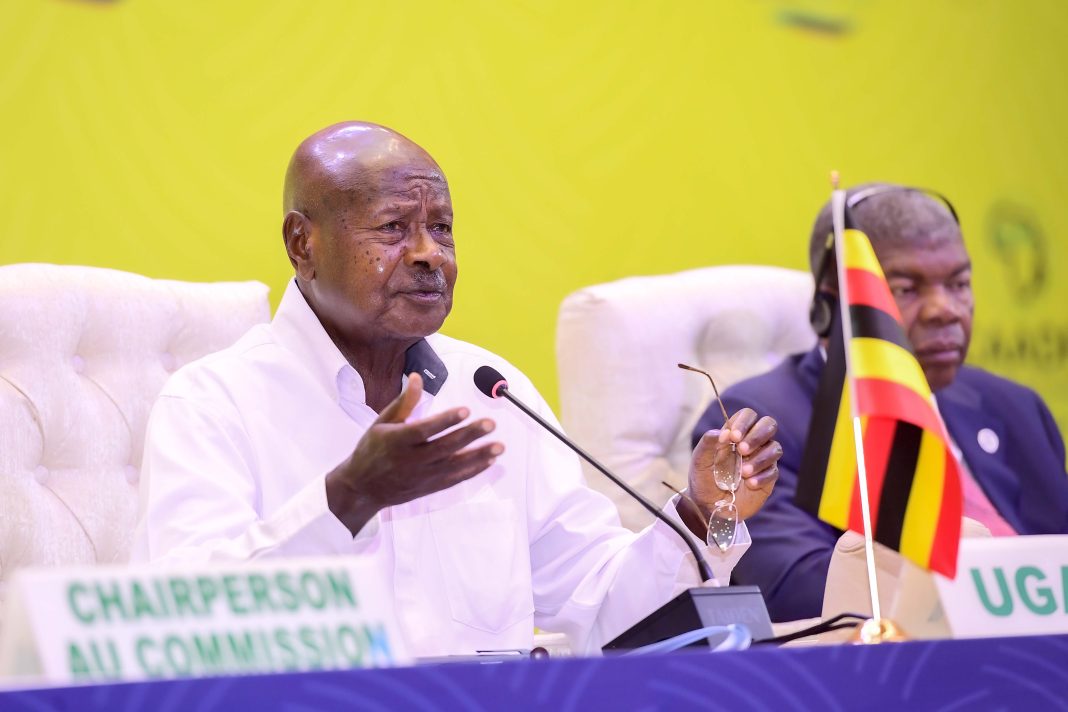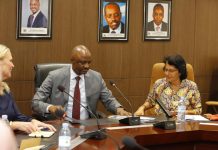President Yoweri Kaguta Museveni has urged African nations to fully harness their agricultural potential as a pathway to economic transformation and self-reliance.
The President emphasized that agriculture holds the key to unlocking Africa’s socio-economic development and reducing dependency on external markets.
He made the remarks today during the African Union Extraordinary Summit on the Comprehensive Africa Agriculture Development Programme (CAADP) held at Munyonyo Commonwealth Resort and Convention Centre.
This extraordinary summit, under the theme “Building Resilient Agri-Food Systems in Africa”, brought together leaders to discuss sustainable agriculture and endorse Africa’s Agri-Food System 10-Year Strategy and Action Plan.
The three-day summit, which started on January 9 and closed today, was attended by over 2,000 delegates, including development partners, heads of state, and agriculture experts from 43 AU member states.
“With two harvests a year in many parts of the continent and abundant natural resources, Africa has the capacity to become an economic superpower. What we need is to move from subsistence farming to modern, commercial agriculture,” President Museveni said.
The President outlined several strategies to achieve this transformation, including the commercialization of agriculture, value addition to raw materials, and the integration of agriculture with other sectors like manufacturing and tourism.
He criticized Africa’s historical reliance on exporting raw materials, describing it as a lost opportunity for wealth creation and job generation.
“A kilogram of raw coffee earns us $2.50, but the same kilogram, roasted and packaged, fetches $40. By failing to add value to our products, we are enriching others while our youth drown in the Mediterranean Sea seeking better opportunities,” he said.
He highlighted Uganda’s success in promoting high-value crops such as coffee, fruits, dairy products, and fish farming, while integrating agricultural production with industries like dairy processing, textiles, and furniture-making.
“Africa must rationalize its agriculture. Smallholder farmers can adopt intensive agriculture with high-value crops, while those with larger lands focus on extensive farming. Both strategies ensure productivity and income security,” he explained.
The President stressed the importance of agricultural value chains, pointing out that integrating agriculture with other sectors would create jobs, increase exports, and strengthen local industries.
“How can we promote tourism if the food our tourists eat is imported? In Uganda, our hospitality industry is firmly linked to local agriculture, ensuring sustainability,” he noted.
President Museveni further emphasized the need for policies to support agricultural modernization, including improved seeds, irrigation, pest control, soil mapping, and discouraging land fragmentation. He also called on Africans to embrace scientific farming practices, which would maximize productivity and reduce poverty.
He further challenged African nations to shift their mindset and recognize the continent’s potential.
“Africa has the resources and capacity to lead. What we need is the determination to transform our agriculture and build industries that create wealth and jobs for our people,” he said.
On the other hand, he emphasized the critical need for sustainable water resource management and the elimination of Non-Tariff Barriers (NTBs) within the Continental Free Trade Area (CFTA).
Highlighting Uganda’s natural abundance of water, President Museveni noted that the country’s primary challenge lies in educating citizens to stop encroaching on vital water resources, including wetlands, forests, catchment areas, riverbanks, and lake shores.
“Our problem is not the availability of water but persuading our uninformed or misinformed people to stop undermining these resources,” he said.
The President contrasted Uganda’s position with the struggles of other parts of Africa, such as Northern and Southern Africa, which face periodic or chronic water shortages.
He proposed innovative solutions, including utilizing the vast water resources of the Congo River and investing in desalination technology.
“Why doesn’t Africa discuss with our brothers in Congo about utilizing the 3,000 billion cubic meters of water that flow into the Atlantic Ocean annually? Is the Atlantic Ocean thirsty for water?” he asked.
He also urged the potential of desalination, pointing out that technological advancements in the field could transform water availability in coastal and water-stressed countries.
“If the cost of desalination goes down, Egypt and other coastal countries will become upstream nations, while those of us harboring the origin of the Nile will become downstream,” he explained.
On the issue of NTBs, President Museveni lamented their negative impact on agricultural production and trade within Africa.
He pointed to Uganda’s capacity to produce diverse agricultural products, including maize, sugar, milk, beef, and poultry, but expressed frustration with erratic trade practices by neighboring countries.
“Why do some brother countries delicense Ugandan products during bumper crop seasons? Let the products compete fairly. When they later experience shortages, they turn to Uganda, but by then, our farmers have been bankrupted and moved to other crops like coffee,” he said.
The President of Ethiopia, H.E Taye Atske Selassie commended Uganda for its exceptional hospitality and leadership in hosting the African Union summit in Kampala, which focused on transforming Africa’s agri-food systems.
“I am deeply grateful to the government and people of Uganda for the warm hospitality extended to us upon our arrival in this beautiful country. Hosting this extraordinary summit is a testament to Uganda’s unwavering commitment to advancing Africa’s agri-food systems. We are truly honored to be part of this significant gathering.”
The President also emphasized the urgency of addressing food security challenges and called for renewed collective action to achieve food sovereignty across the continent.
“It is an honor to address this esteemed assembly. I stand before you to highlight the urgent need for a unified and determined effort to achieve food sovereignty. Together, we can transform Africa’s agri-food systems for the benefit of our people,” he noted.
He noted that the Kampala Declaration adopted during the African Union summit serves as a blueprint for Africa’s collective efforts to transform its agri-food systems, ensuring food sovereignty and security for the continent’s growing population.
He also stressed that empowering women and youth is essential for unlocking Africa’s agricultural potential and fostering sustainable growth.
The Chairperson of the African Union Commission, H.E. Moussa Faki Mahamat, expressed great pleasure in visiting Kampala, a city “dressed in all its colors” to host such an important gathering focused on the continent’s agricultural future.
“It is with great joy that I set foot in this vibrant city of Kampala, which has been chosen to host this critical AU summit on agriculture,” said the Chairperson.
“I am particularly pleased with President Museveni and the government and people of Uganda. My warm thanks for the warm welcome and all the efforts made to ensure the success of this summit,” he said.
H.E Faki further praised Uganda’s leadership in agriculture, noting that holding the summit in Kampala was a sign of the country’s commitment to empowering farmers.
“This summit in Kampala is the right decision; it reflects Uganda’s unwavering commitment to supporting farmers. President Museveni, who himself is a farmer, is also a champion of transforming agriculture for wealth creation across Africa. Ending my tenure with the AU has been a learning experience, one I have gained from you.”
The Chairperson emphasized Africa’s strengths, highlighting that more than 60% of the continent’s population is young and over 60% of its land is arable.
However, he also pointed out the ongoing challenges of food insecurity, noting: “While Africa holds immense potential, hunger and food insecurity still claim lives. The profound dissatisfaction of Africa’s youth, the rise of urban uncertainties, and immigration all heighten our existential crises. But we must not blame the youth; the fault lies in systems that have failed to promote strategies that generate hope and prosperity.”
He acknowledged that these concerns were shared by both African leaders and citizens, emphasizing the need for a concerted effort to address the continent’s agricultural challenges.
“The Malabo Declaration in Mozambique and the subsequent biannual programs have been moments of progress,” he noted.
“This is why I welcome the collaborative efforts of the African Union, regional economic communities, and our technical and financial partners. The work we begin here today will be known as the Kampala Declaration 2025, marking a new chapter in Africa’s agricultural transformation.”
The gathering aimed to finalize the CAADP Strategy and Action Plan 2026-35, which is expected to transform Africa’s agriculture.
The CAADP 2026-35 Strategy and Action Plan is built around six key objectives, including intensifying sustainable food production and agro-industrialization, boosting investment in agri-food systems, and ensuring food and nutrition security.
Other key objectives include advancing inclusivity and equitable livelihoods, building resilient agri-food systems, and strengthening governance.
CAADP was adopted by African Union member states in 2003 as a policy framework to drive agriculture-led growth, enhance food security and nutrition, and increase incomes in Africa’s predominantly agriculture-based economies.
The programme is anchored on seven ambitious goals set to be achieved this year.
In 2014, African heads of state reaffirmed their commitment to these goals in the Malabo Declaration, emphasizing the need for accelerated progress. This follows the 2003 Maputo Declaration and 2014 Malabo Declaration, respectively. The African Union highlights that CAADP initiatives have significantly boosted Africa’s economy through agricultural productivity, trade, and efforts to reduce hunger and poverty over the past two decades.
According to the World Bank, the agricultural sector’s contribution to GDP in sub-Saharan Africa grew by 2% between 2015 and 2020.
The CAADP is Africa’s primary policy framework for driving agricultural transformation, enhancing food security, reducing poverty, and promoting sustainable economic growth. In the past, African governments committed to dedicating a minimum of 10% of public expenditure to agriculture, aiming for annual agricultural growth rates of at least 6% per annum.
In attendance were other Heads of state, including the President of Burundi, H.E. Èvariste Ndayishimiye, the President of the Republic of Kenya, H.E. William Ruto, the President of Angola, H.E. João Lourenço and the President of Somalia, H.E Hassan Sheikh Mohamud.
The event was organized jointly by the African Union Commission, Department of Agriculture Rural Development Blue Economy and Sustainable Environment (DARBE), and African Union Development Agency-New Partnership for African Development (AUDA-NEPAD).























